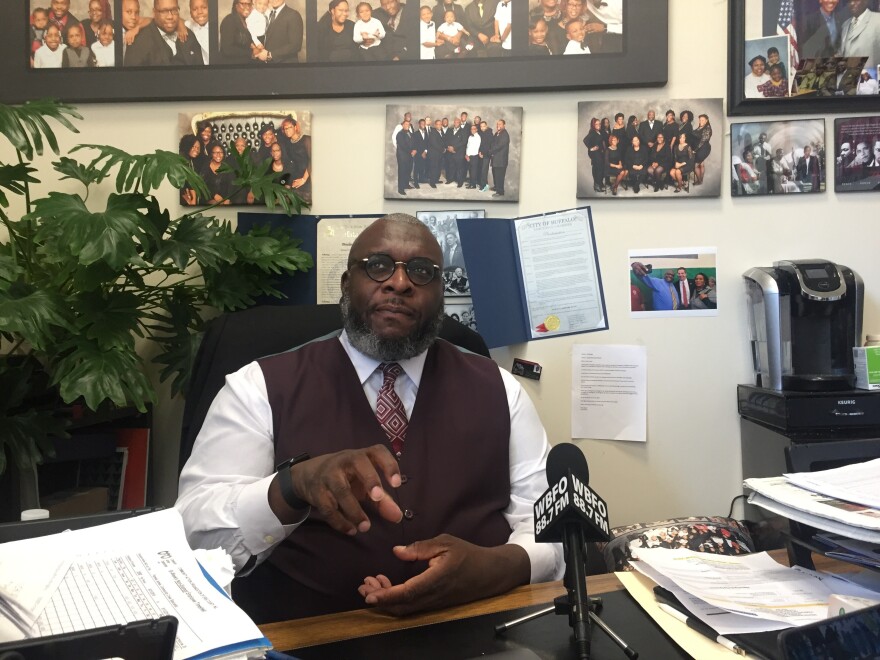The pipeline concept is that out-of-school suspensions can lead to negative outcomes and that dropping out of school can send some students, mostly people of color, spiraling toward arrest and jail.
According to the New York State Education Department, Buffalo Public Schools has the highest overall rate of suspension in the state. And, at 19%, Black students have the highest rate of suspension in city schools.
Buffalo Public Schools Associate Superintendent Dr. Tonja Williams spoke about the issue at a school board meeting earlier this month.
“Children were being suspended out of school at astronomical rates. Long-term suspensions, and short-term suspensions,” she said. “And pretty much it was because the feeling was that was really the only game in town. That was the only trump card.”
The inverse of lots of suspensions acting as the starting point of the school-to-prison pipeline is keeping kids in school so they don’t end up dropping out. But how do we get there?
District Parent Coordinating Council President Sam Radford said out-of-school suspensions should be eliminated.
“We want to start off with no suspending pre-K through second graders, at all,” he said. “And then what we want do is the elimination of out-of-school suspensions for all students and [instead] having in-school-suspensions.”

Radford said a lack of funding to help kids on out-of-school suspension stay on top of their work is a problem. He believes keeping them in school would be a way for kids to remain up to date with their school work.
But getting rid of one form of suspension is only part of the battle. Many kids come from difficult situations at home. Baggage from home often manifests itself at school in the form of behavioral problems which lead to suspensions.
Orniece Hill is taking a holistic approach to discipline. Hill is the principal at Lovejoy Discovery School.
“I started to quickly realize that consequence meant punishment,” Hill said.
She, too, was at the school board meeting, talking about her experience with her students in the last academic year. That year, Lovejoy established a restorative practice philosophy for not just the children, but for staff as well.
The figures Hill shared with the board showed a drastic drop in both short and long-term suspensions from the 2017-18 school year to 2018-19.
But what is restorative practice? Erie County Restorative Justice Coalition Coordinator Dina Thompson says it’s about community building.
“The philosophy of restorative practice,” she said. “Is strong, positive relationships, build strong, positive communities.”

Thompson said there are three tiers to restorative practices: Universal Prevention and Focus, Targeted Interventions, and finally, Intensive Interventions. The focus when working with the Lovejoy school staff last year was on Tier One of the program.
“Looking at just building relationships between staff and staff, staff and students, and student and students,” she said. “Our whole thing was relationship building, that’s all we want to do. We want these positive relationships to be within the school so that students would feel free to open up and share.”
Sharing, Thompson said, involves sitting in circles as a class and discussing what is happening in each other’s lives.
But Radford is skeptical restorative practices will work with such a tight school budget.
“I don’t believe enough money has been put into the restorative practices,” he said.
Without proper funding, Radford believes school staff will revert back to suspending kids.
“If there is no accountability, there’s no training,” he said. “There’s nothing to stop you from doing what you’ve been doing, people, instinctively, are going to do what they’ve always done.”
As skeptical as he is about the district’s ability to fund the program, Radford believes it could work in the long run, as long as out-of-school suspensions are instituted as well.
Currently, Lovejoy Discovery School is in Tier 2 of the program, which involves using affective language and circles involving problem solving and repairing harm.
Will the program be implemented across the district? Supporters of the program are taking a wait-and-see approach.





